From the Onion: Local Church full of Brainwashed Idiots Feeds Town’s Poor Every Week.
[Hat Tip: Steve Bezner]

From the Onion: Local Church full of Brainwashed Idiots Feeds Town’s Poor Every Week.
[Hat Tip: Steve Bezner]
To all those in Rome who are loved by God and called to be saints . . . (Romans 1:7, ESV)
I love this salutation in the opening of the book of Romans.
“To all those in Rome who are loved by God . . .”
Do you see it? Paul addresses the believers in Rome as those who are loved by God. This is true of all believers in Jesus, and yet I’ve noticed that for some of us the idea that God loves us is difficult to accept. Yes, we know he has saved us. But it’s easy for me, at least, to think that he’s holding back his love from me until I get a little more adept at doing this Christian thing.
I was talking recently with a precious young believer who told me about her hard background. She said something very interesting to me regarding her relationship with her earthly father. They were a pair who didn’t naturally get along, but she said that eventually she “chose to love” her father, and he “chose to love her”.
I bring that up because, I admit, often times in my heart of hearts I believe that God is mistaken to love me. I think this because I’m not that lovable, frankly, especially when I compare myself to other believers or to God himself. In other words, it feels like I haven’t earned it yet. I’m a fool for thinking that: God has chosen to love me; his love is not something I can earn. I hope that if you, like me, think God would have to be off his rocker to love you, you’ll let these words, this simple truth, sink deep into your soul: God loves you.
Believer, you are beloved by him. He cares for you in ways you can’t fathom, and he loves you passionately, fervently, with a love that is purer and more intense than any you have ever known on earth. Most of us have a deep, deep need to be loved and fully known. This causes much distress in our lives because of the Catch-22 it embodies: we fear that if we were ever fully known, no one could possibly love us. But God knows us far better than we know ourselves. He knows the truth about us, even the truth we hide from ourselves. He knows ever atom in our bodies and every thought in our heads and every action we’ve ever done, and he loves us.
The second half of Paul’s sentence brings this home: “. . . called to be saints”.
When I was a new believer, many moons ago, the word “saint” in the Bible tripped me up. I thought you only became a saint when men in elaborate robes met in a stone castle and elected you. But someone explained to me, early on, that Biblically all believers in Jesus are saints. The word “saint” simply means “holy one” or “called out one”. A saint is someone whom God is “sanctifying”. Now “sanctify” is another large word that might cause confusion. To be sanctified means to become like Jesus, to be made to conform to his likeness. Take a look at this verse:
For those whom he foreknew he also predestined to be conformed to the image of his Son, in order that he might be the firstborn among many brothers. – Romans 8:29
This hit me like a freight train a few years ago. I thought God saved me to make me a better person. I know now that God has no interest at all in doing small renovation projects on me, or performing minor cosmetic surgery, applying nips and tucks to my often unpresentable life. His goal is not to make me better. His goal is to make me new.
God is remaking me into the image of his Son. This is my destiny. It’s not an optional change, reserved only for the most devoted and dedicated of his followers. It’s the destiny of every person who has placed their faith in Jesus Christ for salvation. He has us, and he means to bring us into perfect conformity with his perfect Son.
He’s not kidding around on this either. Our God is stubborn, zealous, and almighty, and he means what he says. This is the God who led his people with a pillar of fire to the promised land, bringing them out of the land of slavery with plagues and wonders and a strong and mighty hand. This is the God who sent his Beloved through the whips and thorns and nails of the cross to bridge the canyon-like chasm of our horrible sin and make us his sons and daughters. He is not fooling around. If you are a believer in Jesus, you will one day be like him.
Case closed. It’s your destiny.
Claiming to be wise, they became fools, and exchanged the glory of the immortal God for images resembling mortal man and birds and animals and creeping things. Therefore God gave them up in the lusts of their hearts to impurity, to the dishonoring of their bodies among themselves, because they exchanged the truth about God for a lie and worshiped and served the creature rather than the Creator, who is blessed forever! Amen. (Romans 1:22-25, ESV)
For some reason, I’ve recently become more aware of the ocean of idolatry I live in (and often swim in). Gone are the days when I would read of the Israelites rising up to play around the golden calf with a quizzical expression on my face. Idolatry can seem quaint, a relic from antiquity, but only when we are blind to what idolatry is.
Here’s my definition: Idolatry is the expectation, pursued with our daily energy, that there is something out there that can make me happy in the ways that only God can.
There is much that we consider good that can be that graven image of a man, bird, animal or creeping things in our lives. Our family can be an idol. A relationship. Good music.. Our children. Technology – and before you roll your eyes, how excited were you for IOS 7? The day it came out my twitter feed turned into such a river of joy that for a moment I thought perhaps Jesus had returned.
Exchanging the glory of the Creator for the things that he has created is never good; it brings dishonor and destruction into our lives. It also, inevitably, brings disappointment. We weren’t designed to find ultimate satisfaction in things or people. But it doesn’t mean we don’t try. We keep replacing our idols with newer, shinier models because we have an innate knowledge that we were made for better things.
The mistake we make is trying to find joy in better things, or the next, better thrill, or a better relationship, or a better cause, or . . . you get the idea. The chase is fun for awhile, but it gets old. Running around in circles usually does. The scenery starts to look the same. Still excited about IOS 7?
Running after Jesus is the path of real joy, though our idols work very hard at blinding our eyes to that truth. One reason we find joy in Jesus is because Jesus’ path does not go in circles. It goes straight on and up! He is making all things new, including the daily joys of the former idolater who has found the true God that the false ones can only hope to imitate.
We were made by Him. They are made by us. Wise is the person who has compared the Creator’s credentials to those of us idol-makers and has chosen joy!
And you shall remember the whole way that the Lord your God has led you these forty years in the wilderness, that he might humble you, testing you to know what was in your heart, whether you would keep his commandments or not. And he humbled you and let you hunger and fed you with manna, which you did not know, nor did your fathers know, that he might make you know that man does not live by bread alone, but man lives by every word that comes from the mouth of the Lord. Your clothing did not wear out on you and your foot did not swell these forty years. Know then in your heart that, as a man disciplines his son, theLord your God disciplines you.
– Deuteronomy 8:2-5
Happy New Year!
The more I read the Old Testament, the more it seems to me that a major theme of the scripture can be summed up in one word: “Remember”. The Lord constantly reminds us to remember. Remember. Remember what I’ve done for you. Remember my might and my power.
Remember I have humbled you.
If I have cast you down, I will lift you up.
Remember how I made you hungry, and remember how I fed you.
Remember you are not live only on what your appetites dictate. Remember real life is in Me, in My words.
Remember I have preserved you and have provided for you.
Remember I have disciplined you. because I love you.
Remember. I love you.
2013 is past. 2014 is just beginning. May I remember. In many ways 2013 has been a very challenging year. But He has above and beyond provided for us. He has humbled me. and Lord, did I need it. He has made me hungry for Him. He has me now, like never before, feasting on His word. He has disciplined me, and is not done disciplining me.
He has taught me how real idolatry is, and that if I read the history of Israel dismissive of them as they fall to idols again and again, it’s only because I’ve forgotten how to look in the mirror. My heart, as has been said elsewhere, is an idol factory. Idols lead to death. It hurts to see people I care about willingly carried away into idolatry.
The Bible makes it plain that one main reason we get carried away by our idols is that we have failed to remember.
He has shown me people who have nothing, in two different countries, to help me understand how much I have, and to learn to hold it loosely.
He has put people in my path who I didn’t know before, and has blessed me with their friendship, their encouragement, and has even blessed me with burdens for some of them. He has helped me to remember that thinking of others helps loosen pride’s iron-tight fixation on self.
He has taught me that prayer matters, and has helped me grieve, in a good way, upon my prayerlessness. He is bringing me along in prayer, with such a long way to go.
He has reminded me that he loves me. My pride would deny his love, because it appears undignified, because it appears illogical, and because pride would rather sit alone, starving, feeding itself on rocks than fall into the healing hands of the King who alone has the true food our souls crave. Thanks be to God, His love is also fierce and stubborn and relentless and it laughs for joy as it crushes Pride as fine as the dust.
He has helped me remember that service is not a burden, but a joy. I battle this because another idol in my life is sloth. Yes, that needs to be crushed too.
Hoping for more Jesus in 2014. And to always remember.
Merry Christmas!
For the longest time (since 2005) this blog was based on software I had written called “Bloo” (hence the name). I realized sometime early last year that it was probably time to move on. Bloo did a good job. I was even kind of proud of it. There are still a few blogs out there that run on it. But, it is essentially “abandonware” now; I haven’t released anything new on it since December, 2011.
So, I have written a utility that converts a Bloo blog to WordPress. I converted this space once before to WordPress, then backed it out, but now I’m doing it for real. And this, the very first Bloo blog, is the very first blog to be converted to WordPress. I will shake things out here for awhile and then release the code so that anyone else who would like to convert can.
I’ll have to play with the theme or find a new theme as well, most likely.
In other news, I am (at least hoping to be) “back” in the blogosphere. I’m hoping to find my voice here in this little corner. And I can’t believe I just used the phrase “find my voice”.
Merry Christmas. God loves you!
My notes from The Gospel Project, session 1: The God who Speaks
Question: What might be some of the reasons people don’t want to believe that God has spoken?
There are many reasons. Some people are still blind and deaf to him. Others believe, but don’t want to obey.
We may often find ourselves in that second category. If everything you hear from God is something you’re comfortable with, you need to ask yourself if you’re really hearing from him.
So God created man in his own image,
in the image of God he created him;
male and female he created them.And God blessed them. And God said to them, “Be fruitful and multiply and fill the earth and subdue it, and have dominion over the fish of the sea and over the birds of the heavens and over every living thing that moves on the earth.” And God said, “Behold, I have given you every plant yielding seed that is on the face of all the earth, and every tree with seed in its fruit. You shall have them for food. And to every beast of the earth and to every bird of the heavens and to everything that creeps on the earth, everything that has the breath of life, I have given every green plant for food.” And it was so. – Genesis 1:27-30
The God who speaks gives us tasks
Notice the progression. God created, because he had authority to do so. Then God blessed, showing his mercy. Then he tasked his creatures with a mission.
Question: Why is it important to understand this progression?
It’s extremely important to understand, because our natural inclination is to get it backwards. We believe that we work first, and then God blesses.
Think of the pattern in scripture. God first delivered the children of Israel from slavery in Egypt, and then after that he gave them the law on Mount Sinai. When Christ was on the cross, he shouted “It is finished”; the work of our salvation was done, and our forgiveness was accomplished, while we were still dead in our sins and enemies of God. When he saved us, he blessed us with power from on high in the person of the indwelling Holy Spirit. It was only then that he commissioned us (Matthew 28:19)
But God, being rich in mercy, because of the great love with which he loved us, even when we were dead in our trespasses, made us alive together with Christ–by grace you have been saved–and raised us up with him and seated us with him in the heavenly places in Christ Jesus, so that in the coming ages he might show the immeasurable riches of his grace in kindness toward us in Christ Jesus. For by grace you have been saved through faith. And this is not your own doing; it is the gift of God, not a result of works, so that no one may boast. For we are his workmanship, created in Christ Jesus for good works, which God prepared beforehand, that we should walk in them. – Ephesians 2:4-10
We invert the gospel. From the study notes: “When we begin with the task rather than the blessing, we cut ourselves off from the very power that is necessary to fulfill the tasks God has given us.”
We have to daily remind ourselves that God has done the work! Any good that we do must be in the power of the Holy Spirit and only in grateful response to what God has already done.
Questions:
Has God spoken to you through his word in the past few months? What scripture passages has God used to speak to you?
What blessings have you received from God in the past few months?
What tasks has God presented to you as a result of those blessings?
My notes from The Gospel Project, session 1: The God who Speaks
Now Moses was keeping the flock of his father-in-law, Jethro, the priest of Midian, and he led his flock to the west side of the wilderness and came to Horeb, the mountain of God. And the angel of the Lord appeared to him in a flame of fire out of the midst of a bush. He looked, and behold, the bush was burning, yet it was not consumed. And Moses said, “I will turn aside to see this great sight, why the bush is not burned.” When the Lord saw that he turned aside to see, God called to him out of the bush, “Moses, Moses!” And he said, “Here I am.” Then he said, “Do not come near; take your sandals off your feet, for the place on which you are standing is holy ground.” And he said, “I am the God of your father, the God of Abraham, the God of Isaac, and the God of Jacob.” And Moses hid his face, for he was afraid to look at God. – Exodus 3:1-6
Deism teaches that God created the world but took a hands-off approach from that point on, not interfering in our world but just letting it run on its own. Some people have this belief, and even many Christians who don’t hold to Deism live as though they do. But the God revealed in scripture is not the deist’s God. He breaks into human history for our salvation. Exodus 3 records one of these breakthroughs.
The God who speaks is merciful to reveal himself to us
God created us to have fellowship with him, but not because he is needy and not because he was lonely. Within the Trinity God enjoys perfect love-relationships and has no need of us. But he did decide to create us, as an act of grace. As the study notes say, “He created us to fellowship with Him, to join in the love song the three Persons of the Trinity sing to one another.”
Question: If you were to hold a deist view of God’s revelation, how would that affect your life? How would it affect your view of the Bible?
But in contrast to the silence imagined by the deist, God has spoken, and he has reached down to us. This is the good news of the gospel. Like Helen Keller, we are naturally blind and deaf to him. We needed his touch. We needed him to be with us, to touch us, and to bring us light.
In the beginning was the Word, and the Word was with God, and the Word was God. He was in the beginning with God. All things were made through him, and without him was not any thing made that was made. In him was life, and the life was the light of men. The light shines in the darkness, and the darkness has not overcome it. – John 1:1-5
And the Word became flesh and dwelt among us, and we have seen his glory, glory as of the only Son from the Father, full of grace and truth. – John 1:14
God can break through into your life, how and when he wants to, and when he does he will bring a burning that does not char and consume, and light where there was no light, and will turn the mundane desert and dry bushes of your world into holy places. In Christ he can and will send you to take the message of freedom to those who are still in chains. He has a people that he has called to himself, and his mission, in which he condescends to involve us, is one of mercy, rescue and deliverance. “Let my people go!”
My notes from The Gospel Project, session 1: The God who Speaks
Someone was drawing water and my teacher placed my hand under the spout. As the cool stream gushed over one hand she spelled into the other the word water, first slowly, then rapidly. I stood still, my whole attention fixed upon the motions of her fingers. Suddenly I felt a misty consciousness as of something forgotten – a thrill of returning thought; and somehow the mystery of language was revealed to me. I knew then that “w-a-t-e-r” meant the wonderful cool something that was flowing over my hand. That living word awakened my soul, gave it light, hope joy, set it free! There were barriers still it is true, but barriers that could in time be swept away.
– Helen Keller, The Story of my Life
A light breaks through.
This moment was a turning point for young Helen Keller, only six at the time, and it released her from the dark silent world of wordless thought that she had lived in since she was 19 months old.
We were made to communicate. When we’re deprived of it, we suffer. Think about the movie Cast Away. Do you remember who became protagonist Chuck Nolan’s closest friend? A volleyball named Wilson. Chuck shared his life with that ball. He had to. Man was not meant to be alone.
The Lord created language and gave us the capacity for it. Have you ever noticed how powerful words are? And the more powerful or significant the speaker, the more powerful the words. For example:
In the beginning, God created the heavens and the earth. The earth was without form and void, and darkness was over the face of the deep. And the Spirit of God was hovering over the face of the waters. And God said, “Let there be light,” and there was light. – Genesis 1:1-3
The God who speaks has authority
re’shiyth ‘elohiym bara’ ‘eth shamayim ‘eth ‘erets
These seven Hebrew words describe the initial creative activity of our Creator God. In the beginning, God created the heavens and the earth. It should be noted that the word elohiym, which we translate as “God” is a plural noun, but the verb bara is singular, and describes creation out of nothing, the kind of creation only God can do.
A plural, singular God. Many scholars believe this is an early Jewish echo of the Trinity. A God who is self-existent in three separate Persons yet one Godhead, who had no need of anything and lives in a perpetual love relationship with the other members of the Trinity chose to bara, to create. And all he had to do was to speak to bring everything we know and all that we don’t know into being.
It was God’s word that created light. The Hebrew literally says “Light be!”, followed by the single word, recognizing the newly sprung, brilliant and glorious creation: “Light!”
Question: In what ways does the impact of a word of encouragement or criticism change depending upon the source?
Compare the impact of these words: “I now pronounce you husband and wife” to “Do you want fries with that?” One is life-changing. The other results in a salty snack.
Praise him, sun and moon, praise him, all you shining stars! Praise him, you highest heavens, and you waters above the heavens! Let them praise the name of the Lord! For he commanded and they were created. – Psalm 148:3-5
We have a God who speaks with supreme authority. This separates him from all the idols of this world.
Why should the nations say, “Where is their God?”
Our God is in the heavens; he does all that he pleases.
Their idols are silver and gold, the work of human hands.
They have mouths, but do not speak; eyes, but do not see.
They have ears, but do not hear; noses, but do not smell.
They have hands, but do not feel; feet, but do not walk;
and they do not make a sound in their throat.
Those who make them become like them;
so do all who trust in them. – Psalm 115:2-8
What are the implications of this?
Our God speaks, and he speaks with ultimate authority. He speaks through both general revelation (Psalm 19) and special revelation (his word, the Bible).
We should listen.
How does the belief that God speaks affect our day to day lives? I think there are many good answers to this question, but I’m reminded of the moment light and speech broke through for Helen Keller.
w-a-t-e-r
Our God who speaks and who loves us brings things out of nothingness, brings light to dark places, brings wisdom and direction and guidance. But most of all, he brings touch and closeness, relationship. The creator of the universe condescends to speak to such as we are.
Amazing.
The two day Battle of Shiloh, fought April 6-7, 1862, was the first really big, really bloody battle of the war between the states, fought largely by green soldiers who had not yet seen combat. Civil War historian Shelby Foote has called Shiloh a “disorganized, murderous fist fight”. The battle of Shiloh was fought by over 100,000 soldiers, with over 24,000 men killed, wounded or missing. It was a bloodbath, and it sent deep shock waves through the citizenry. It was a wake up call that this was going to be a terrible, terrible war.
For the second day of our adventure, Andrew had an inspired idea. He suggested we wake up early and jog the Shiloh battlefield at sunrise. We all agreed that was a great idea so we woke up early this morning and made our way to Shiloh.
Tennessee is pretty. Very pretty. But the place we’re staying at, Counce Tennessee, is home to a paper factory. Thankfully our hotel is outside of the blast zone, but driving within three blocks of the factory is like driving through a high pressure dome of smell. Unfortunately, we had to pass this olfactory hazard to make it to the Shiloh battlefield.
We arrived and parked at the still-active Shiloh Methodist church. Unfortunately I failed to photograph the original Shiloh church which is nearby. It is a log cabin (and as I found out later, just a replica) that was the scene of heavy fighting the first day of the battle, and gave the battle its name.
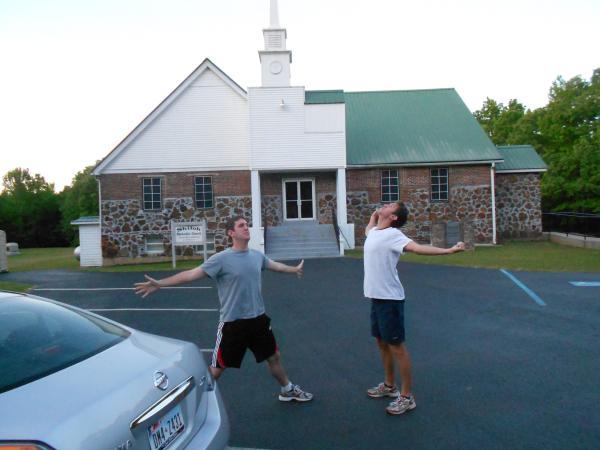
Andrew and Kenny, pretending to warm up
We set off at a jog from Shiloh church, stopping periodically to take in various monuments and points of interest.
We ran east of the church, along the Sunken Road and the Peach Orchard (currently being replanted, evidently), scenes of heavy fighting and critical resistance mounted by the Union against the strong Confederate attack on the first day of the battle. We turned northward and stopped at Bloody Pond. It is named thus because of the wounded of both sides who dragged themselves to the pond to slake their thirst with water which soon grew dark with the blood of the dead and dying.
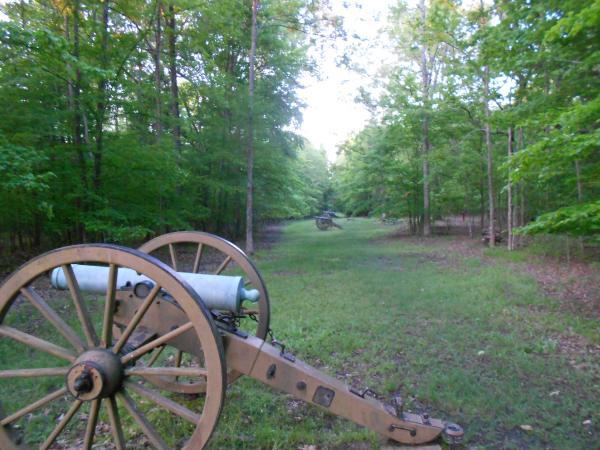
The Sunken Road
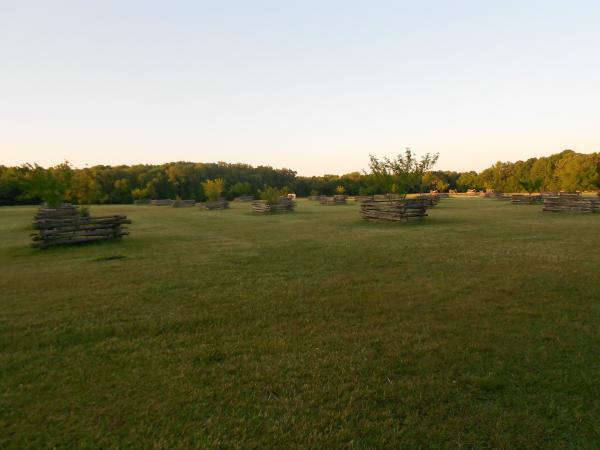
The Peach Orchard, currently being replanted
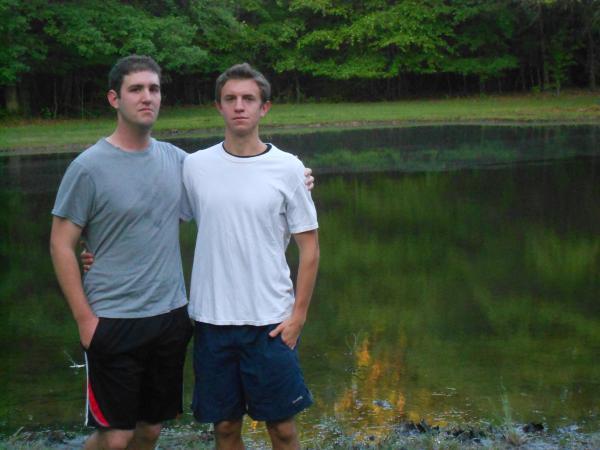
Andrew and Kenny at Bloody Pond
We ran toward the Visitors center, near Pittsburg Landing, where Buell’s reinforcements disembarked on the evening of the first day of battle, helping to turn the tide for the Union. We failed to find the landing (we didn’t have a map) so we turned around and ran back to Shiloh church. I estimate we ran about five miles all told.
We headed back to the hotel for breakfast, then showered and rested before getting some pizza and heading back to the battlefield.
We started at the Visitor’s Center this time, where Kenny and Andrew donned period uniforms and posed for pictures.
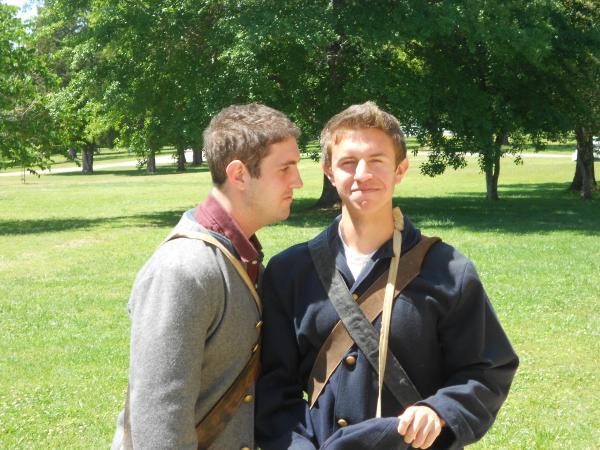
Andrew and Kenny – North versus South
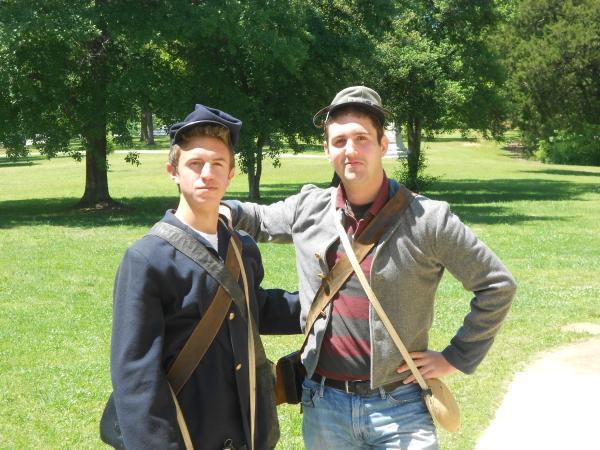
Reconciliation
Following this, we walked the battlefield for several more hours. Shiloh is an extraordinarily well-preserved battlefield, and smaller than some of the later battlefields we visited, and it is relatively easy to picture what happened.
There are 3,584 Union dead (of whom 2,357 are unknown) buried at the cemetery. Shiloh was an early battle, fought before the Union had its processes developed for dealing with casualties. With warm weather coming on, most of the dead from the battle were buried quickly; the Union soldiers were buried in individual graves and the Confederates were buried in trench-shaped mass graves. The Union soldiers were disinterred years later and laid to rest in Shiloh National Cemetery. It is disconcerting to note how many of the dead went unidentified.
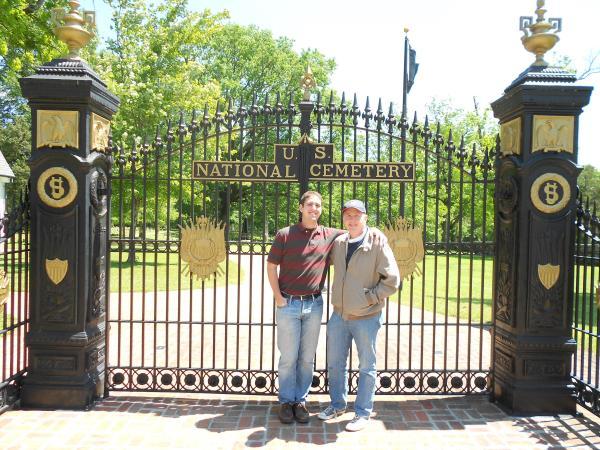
Me and Andrew, in front of Shiloh National Cemetery
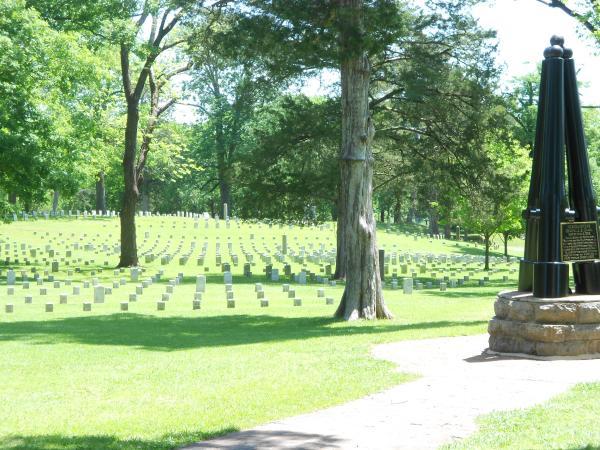
The graves at Shiloh. The short graves mark the unidentified, with just a number inscribed
We then walked to Pittsburg Landing on the Tennessee river. This is where reinforcements eventually arrived to bail General Grant out. It was really kind of foolish for Grant to deploy the Union army with its back to this river and creeks on its right and left flanks. The army was completely boxed in and narrowly avoided disaster when the Confederates attacked and pressed it to the river.
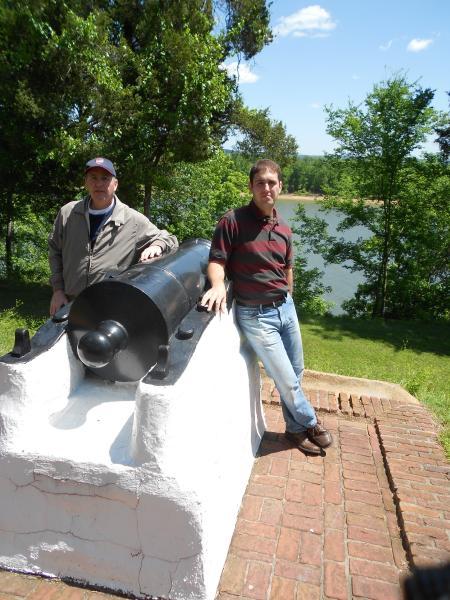
Above Pittsburg Landing
The commander of the Confederate army was Albert Sidney Johnston, a gallant and well-respected Southern general. He led the final charge against the Peach Orchard personally, and was mortally wounded in that charge, having received a bullet behind his left knee which severed an artery. He could have been easily saved, but he had sent his personal doctor to go tend the wounded of both his own army and also the wounded among the captured union soldiers. There was no one around him who realized that he needed a tourniquet until it was too late. We stood quietly at the site of his passing, in a ravine some distance from where he was wounded. None of us had much to say.

General Albert Sidney Johnston was mortally wounded here
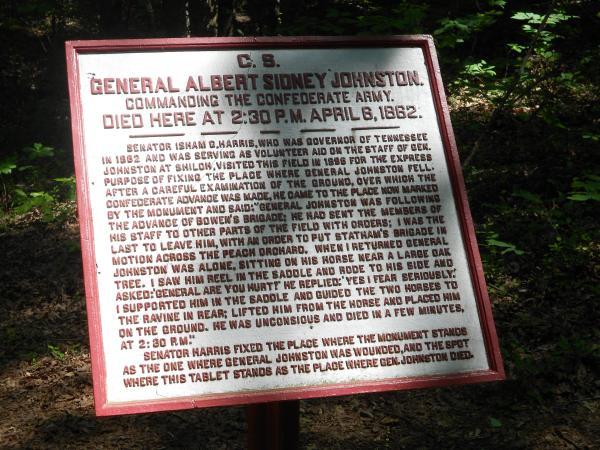
He died in this ravine, about fifty yards away
Shiloh was one of the first battles where places of terrible carnage received names that would live on, names like “Bloody Pond” and “The Hornet’s Nest”, We paused for a moment at the Hornets Nest, a tangled thicket and the site of some truly awful combat.
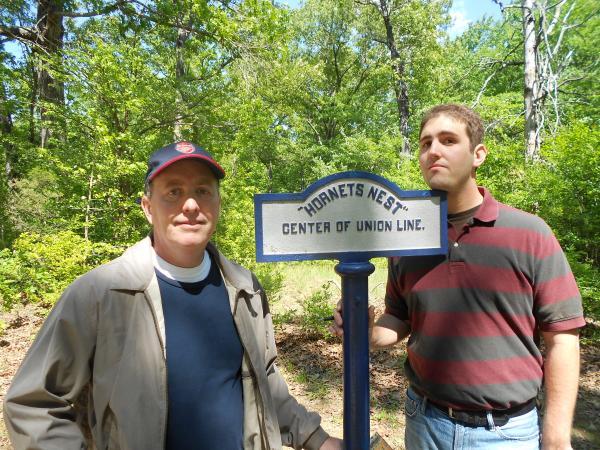
At the Hornet’s Nest
Like all Civil War National Parks, the grounds are dotted with monuments to the various units that fought in the battle, with the monuments set on the field of battle where the units were known to be engaged.
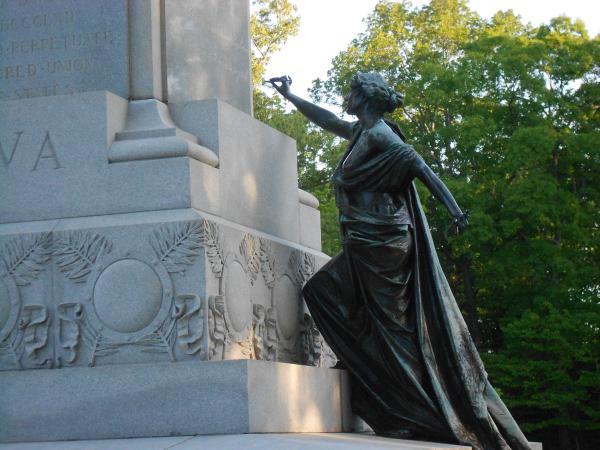
Monument to the soldiers of Iowa

Monument to the soldiers of Wisconsin
Here is one of the five known burial trenches containing Confederate dead.
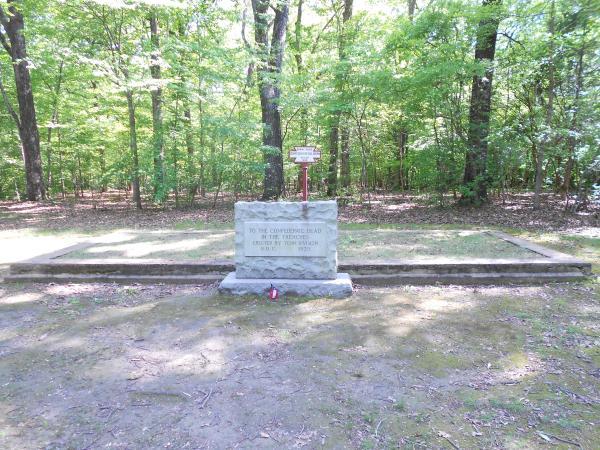
One of five known Confederate burial trenches
Shiloh was a Union victory, but just barely. It is said that on the night of April 6th, after that first terrible day of fighting, General William Tecumseh Sherman located Ulysses S. Grant and said “Well, Grant, we’ve had the devil’s own day, haven’t we?”
In typical fashion, Grant replied, “Yes. Lick ’em tomorrow, though.”
And he did.
We left Shiloh around 4:30pm and drove to Franklin, Tennessee. We ate dinner at the Bunganut Pig, which is an English-style pub. Jill had worked things out so that our longtime friend Nellie, who first introduced me to Jill way back in the day, could join us for dinner. Andrew, Kenny and I arrived early and snacked on potato wedges until Nellie showed up. When she did show up, I got up excitedly to give her a hug, accidentally sending my large, full glass of ice-water flying. Nellie got a kick out of that. I live to amuse.
It was great reminiscing with Nellie about our days in Glorieta, NM, and all that has happened since.
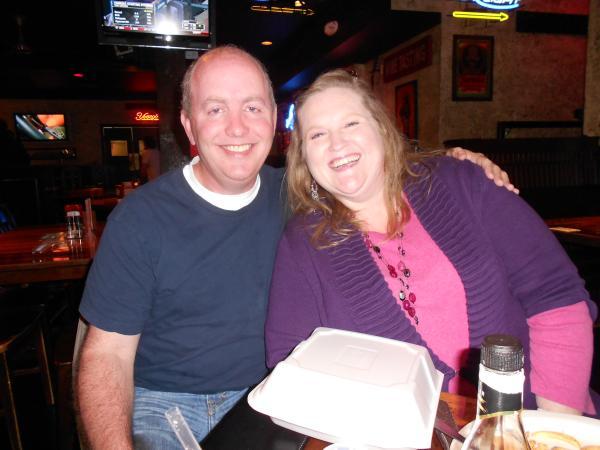
Reunion with my good friend, Nellie
Following our meal, we said our goodbyes and drove to Murfreesboro, the site of the Stone’s River battleground, which we’ll visit tomorrow.
Date: very early Sunday morning, April 22
Who: Three sleep-deprived men. Yours truly, my son Andrew, and his friend Kenny
Our Objective: Experience the battlefields of the Civil War in the Western theater (primarily Tennessee). Almost exactly ten years ago, Andrew and I had toured the battlefields in the Eastern theater; Gettysburg, Antietam, Bull Run. Our goals this time include Shiloh, Chickamauga, Lookout Mountain, Stones’ River, Vicksburg.
Our Day 1 destination: Oxford Mississippi, to visit Faulkner’s house, and then on to Tennessee.
We started out before 6:00am. None of us had much sleep the night before, Andrew and Kenny having arrived around 2:00am that morning, and me having had a whirlwind day of getting ready for the trip and a fitful night of sleep that started around 11:30pm.
We piled our bags into our rented Nissan Altima. And it is at this point in my narrative that I must digress:
Digression:
I rented the car the previous day. Jill drove me to the airport and we picked the car up around 3:30pm. Upon driving out of the lot, I noticed that the transmission appeared stuck; it was not shifting out of first. This struck me as odd, since the car only had about 3,000 miles on it. So now to get it back to the rental lot and raise a fuss.
But how to get back to the rental lot? You see, in the time it took me to realize that the car wasn’t shifting, I was already on the highway that leads toward the airport, because I took a wrong turn. Jill, undoubtedly rolling her eyes at seeing this oft-repeated circumstance, patiently waited for me to figure out which way was what, and after about ten minutes I was finally back at the rental place.
I pulled in. Shut the car off (in disgust!), stepped out of it and notified the attendant that the transmission on this car must be shot. He gave me a strange look, but, wronged as I was, I paid him no mind and marched over to the rental desk and announced that I needed a new car because the one they had rented to me was no good. They too gave me a quizzical look, asked for my paperwork, and then, as I was checking out which car I now wanted, with Jill texting me that I should demand an upgrade, they promptly lost my paperwork. After scrambling around for several minutes, they found it again. The lady behind the counter had accidentally handed it to one of the attendants who was using it as a scratch pad to scribble notes.
This was all too much. I was swiftly approaching high dudgeon when the original attendant to whom I had dropped the car off drove up . . . in the car. Here’s how the conversation went.
Attendant: I don’t think there’s anything wrong with this car.
Me (smiling patronizingly): well, you’ve only driven it in this lot. You need to take it out and get it up to speed and then you’ll see that the transmission isn’t working.
Attendant: I did. This transmission works fine.
Me (speaking as to a young, wayward student): Impossible. When I drove it, it was stuck in first gear.
Attendant (smiling like the mongoose before he devours the snake): That’s because you had the car shifted down to first gear.
He was nice enough not to add you idiot to the end of that. He had to show me what I did wrong: the Nissan Altima does indeed have a shifter that will lock into first gear if you push it all the way to the left, which I did.
In my defense, do people go mudding or haul trailers in their Nissan Altima?
Well, I guess some do. Chastened, and having offered apologies all around, I drove off the lot sheepishly in my perfectly operational rental car, with personal dignity much less operational.
/Digression Fin
So we started out. I drove for the first four hours until Andrew took over. My shift carried us across that invisible line between Texas and Louisiana, in which the landscape changes almost immediately from the familiar Texas landscape to the strangeness of driving on stilted highways through the enormous, shabby green sight (and smell) of Louisiana Bayou. We occupied ourselves by listening to a great audio book, Moneyball by Michael Lewis. Fascinating, funny, and I’ll never watch a baseball game the same way again.
We stopped for lunch and ate some strange tasting (or strangely tasteless) chicken at a KFC somewhere in Mississippi, and then continued on. Our immediate goal was Oxford, Mississippi, and we needed to get there before 4:00pm, because that’s when Faulkner’s house, Rowan Oak, closed for the day. We got to Oxford, around 3:20, and, following some poorly worded advice from the Google map printout, promptly turned the wrong way. We discovered the error of our ways about five miles later, called the Rowan Oak number, got ourselves some better advice, turned around, and again asked directions from a yellow-jacketed security person when we hit the University of Mississippi. Turns out we had overshot again. We turned around, got to the right street, and finally made it to Rowan Oak with about twenty minutes to spare.
William Faulkner lived at Rowan Oak from the early thirties until his death in 1962. I haven’t read any Faulkner, but Andrew is a big fan, and I guess it’s time I picked up something by this author. My understanding is that he is one of the great American authors, one of those mid 20th century southern writers who wrote in a rather dark vein.
Some pictures:
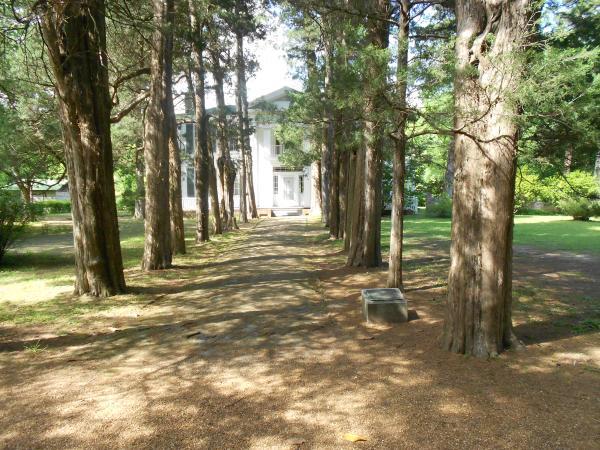
Rowan Oak

Kenny, Andrew and me

Faulkner’s library
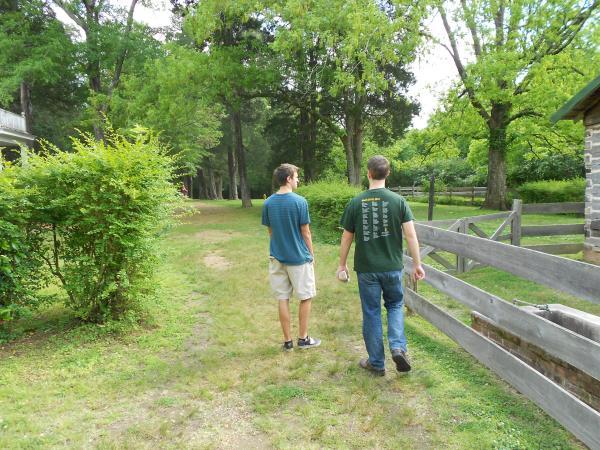
Walking the grounds
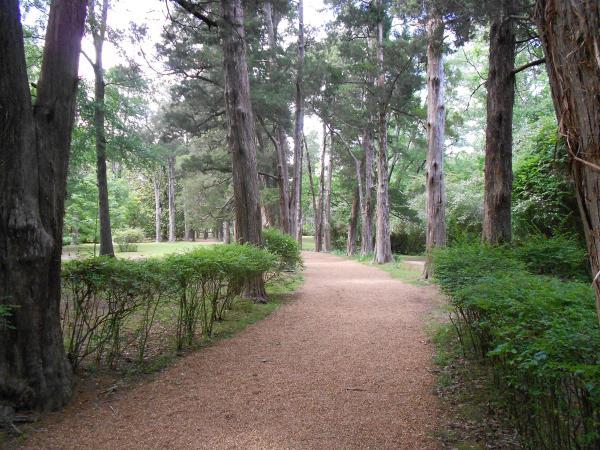
There are some great trees on this property
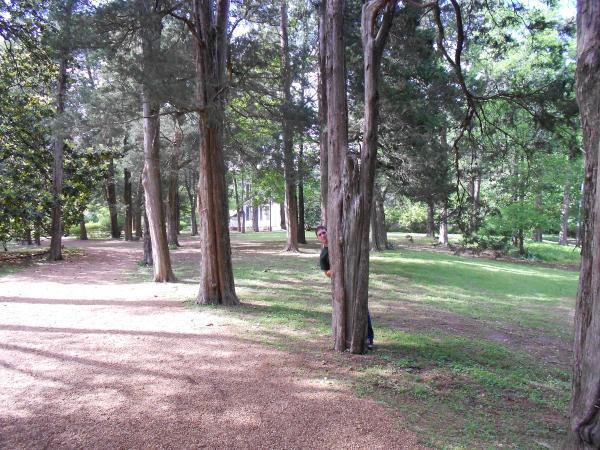
Where’s Andrew?
The visit to Rowan Oak was worth it. A good stop.
At this point, Kenny took over driving and took us the two hours to Counce, Tennessee, which is twenty minutes or so away from the Shiloh battlefield. We checked into our hotel, then grabbed a bite at a local eatery called The Ribcage, which has good food and gave us our first experience with Tennessee accents; for instance, the waitress asked us after the meal if we wanted some “paa” (Key Lime Pie).
Back to the hotel to rest up for an early start tomorrow.